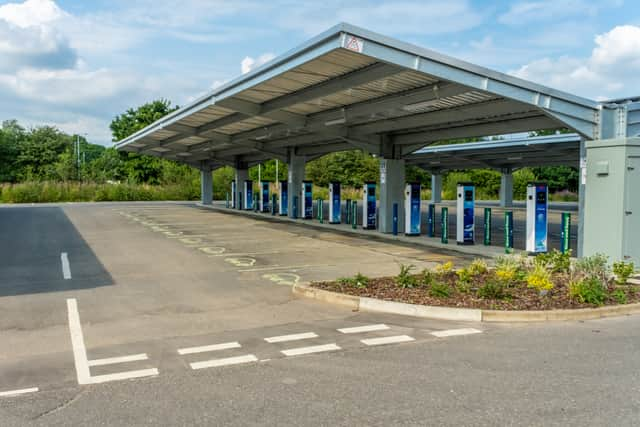ChargePlace Scotland: 1 in 4 public EV chargers has a fault, claims BBC investigation
and live on Freeview channel 276
Almost a quarter of Scotland’s public electric vehicle chargepoints have been found to have some sort of fault by a new investigation.
BBC Scotland’s Disclosure programme examined the country’s publicly-owned chargepoint network over a number of weeks earlier this year and found that 22% of ChargePlace Scotland units had problems. These issues ranged from broken connectors and screens to units being offline.
Advertisement
Hide AdAdvertisement
Hide AdAlthough other private networks also offer EV charging in Scotland, ChargePlace Scotland, which was set up by the Scottish Government, accounts for the vast majority of public charging devices in the country. The BBC investigation used information from the official ChargePlace Scotland App and only examined the status of chargers operated under the ChargePlace Scotland scheme.
Over a six-week period in August and September, the investigation found problems reported at 535 of the 2,388 chargers, most of which are owned and maintained by local councils. The programme found that every single charger in the Scottish Borders had logged a fault over the six-week period. Close behind, Highland, West Lothian and East Dunbartonshire councils had issues on more than 94% of their machines.
Transport Scotland, which oversees the network said it had not seen the full data used by the BBC but claimed that the network had an overall “up-time” of between 95% and 97%. It added that the network was successfully used by 1.7 million drivers in 2021.
A Transport Scotland spokesperson said: “We haven’t been provided with the full data ahead of broadcast and so cannot yet verify the findings put forward by the BBC, but we will carefully consider this analysis alongside our own data.
Advertisement
Hide AdAdvertisement
Hide Ad“The network operator has worked hard to improve reliability and we are now seeing the benefits of this approach, with an overall up-time of between 95% and 97%.
“However, we want it to be even better, which is why reliability, alongside accessibility and availability, are at the heart of our draft vision for Scotland’s public electric vehicle charging network.”


Neil Swanson, director of the Electric Vehicle Association (EVA) Scotland questioned the accuracy of the BBC’s data but agreed that the country’s charging network still had room for improvement. He told National World: “EVA Scotland is aware of the need to further improve the availability and reliability of Scotland’s public charge point network.
“The BBC Scotland Disclosures programme appears, in this case, not been able to access consistent and concurrent data in its report. As Transport Scotland indicates, the network has an overall uptime of between 95% and 97% and the operator is seeking to further improve these figures.
Advertisement
Hide AdAdvertisement
Hide Ad“The association is in regular contact with Transport Scotland and charge point owners regarding the operation, maintenance, and reliability of the network. Our independent monitoring of the network has shown improvement over the last six months. We continue to have concerns over fault repair times and the risk this presents in rural areas.”
When the ChargePlace Scotland network launched it offered free charging to try to encourage the uptake of EVs. However, more than half of local authorities - 18 of 32 - now apply fees to charging and Mr Swanson said this should generate investment to improve the reliability of the network as well as easing congestion at busy chargers by discouraging overstaying.
The Transport Scotland spokesperson added: “Most local authorities have already removed free charging tariffs and by working with partners to create the conditions for more private sector investment, coupled with our new public EV infrastructure fund, we can deliver public charging infrastructure which supports the 18,000 domestic and business charge points already delivered as part of Scotland’s wider charging mix.”
Comment Guidelines
National World encourages reader discussion on our stories. User feedback, insights and back-and-forth exchanges add a rich layer of context to reporting. Please review our Community Guidelines before commenting.
